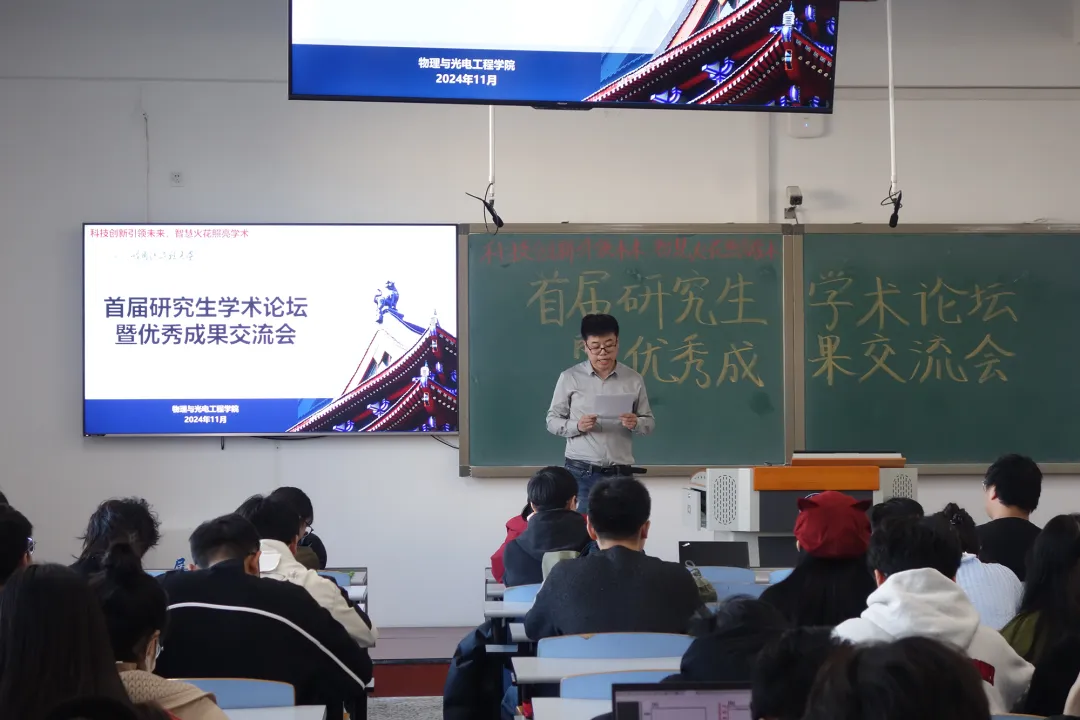
High-level academic exchanges are an important way to cultivate the innovation ability of postgraduate students. In order to strengthen the academic exchanges among postgraduate students, create a strong scientific research and academic atmosphere, and broaden the academic vision and knowledge of postgraduate students, the School of Physics and Optoelectronic Engineering held the first postgraduate academic forum and outstanding achievement exchange meeting in the large classroom 3100 of Building 21B on the afternoon of November 20. The theme was "Technological Innovation Leads the Future, and the Spark of Wisdom Illuminates Academics". Professor Zhang Yu, the deputy Party secretary and vice dean of the college, attended the event. Ren Yongzhi, the assistant dean, presided over the event, and representatives of postgraduate students from various grades participated.

The forum invited 11 outstanding postgraduate students who won the college's Outstanding Research Achievement Awards in 2024 as keynote speakers to tell other postgraduate students about their academic achievements, research directions, innovative methods, and experiences.
Zhang Yu delivered a speech for this forum. She encouraged the students from three aspects: learning, life, and goals. During the postgraduate stage, they should attach importance to the cultivation of academic thinking and the training of scientific research abilities. In particular, they should pay attention to academic exchanges, focus on the cultivation of their own comprehensive abilities, always maintain good learning and living habits, actively participate in various academic activities, and continuously improve their academic abilities in practice.

Chen Yuzhou introduced the basic principles of liquid crystal elastomers. In response to the high driving temperature of liquid crystal elastomers, he carried out research on the preparation and performance of low-temperature liquid crystal elastomers with an adjustable driving temperature range. He also shared his research experience and paper writing insights on how new researchers can quickly enter the state of scientific research.

Wei Jinhe introduced the performance research on the application of supercapacitors. She conducted in-depth discussions on the conductivity, stability and electrochemical performance of electrode materials and carried out the design, synthesis and optimization work of materials. She also shared the drawing methods to improve the overall professionalism and readability of the papers.

Jiang Zhaoqi introduced the basic principles of spin-momentum locking of electromagnetic waves. Focusing on programmable artificial surface plasmonic metamaterials, he carried out research on optical spin Hall logic devices. He also shared his own research experiences and insights on how to select research topics.

Cheng Siying introduced the research background of all-optical sensing, storage and computing technology, how to use optical fibers and phase change materials to construct integrated storage and computing devices, the basic principles of phase change materials, carried out the preparation and performance research of the devices, and discussed with the students the existing problems in this field and the subsequent research plans.

Li Xiaolan introduced the basic principle of the electrical tuning of cholesteric liquid crystals. By utilizing the interaction between positive liquid crystals and negative liquid crystals under the action of ions, she carried out research on the electro-optical characteristics of cholesteric liquid crystal films doped with ions. Based on her own research experience, she also shared her experimental insights and paper writing methods.

Wang Zhen introduced the development background of optical fiber optical tweezers technology. Based on a kind of photopolymerizable material, he introduced a novel preparation method for optical fiber optical tweezers and conducted in-depth research on its trapping ability. He also shared his experience in postgraduate employment with his classmates.

Tian Tian introduced the basic principles of fiber optic sensors. Through the in-situ coating technology in the strong modulation region, the light-matter interaction of the fiber was periodically enhanced. The dual LPFG waveguides worked together to achieve the improvement of sensing performance. She also shared her insights on the transformation process from undergraduate to postgraduate.

Shen Yu introduced the performance research of CoNi bifunctional catalysts in zinc-air batteries. He conducted in-depth discussions on the preparation of electrode materials, electrochemical performance and long-term test stability. He also combined theoretical calculation, simulation and experimental verification to identify the real catalytic sites.

Student Mao Liming introduced the research on novel rare earth-doped fluoride glass-ceramics for visible to mid-infrared luminescence. The introduction covered the background of mid-infrared luminescence materials as well as the applications and research of glass-ceramics. He shared the work contents such as the preparation of fluoride glass-ceramics and their material properties and optical properties. He also shared his personal insights and experiences in student work and scientific research work with his classmates.

Wang Qingxiu introduced the basic principles and applications of cholesteric liquid crystals and presented an introduction to the multi-dimensional anti-counterfeiting based on light/heat-responsive CLC microspheres. In this research, a 4D anti-counterfeiting soft label with programmable shape memory and cooperative color change was fabricated using thermotropic liquid crystals and shape memory gel materials. She also shared her scientific research insights and practical drawing skills with her classmates.

Student Zhou Dong introduced the basic principles and applications of liquid crystal fiber-optic laser sensors. For non-invasive disease detection, a new type of liquid crystal-based fiber-optic gas sensor was developed, which can be used to detect acetone exhaled by the human body. He also shared his paper writing experience and the use skills of scientific research software with his classmates.
The holding of this postgraduate academic forum has provided a platform for postgraduate students with different directions and academic backgrounds to conduct in-depth, multi-angled and all-round exchanges and discussions on scientific research and academic issues. At the same time, it has expanded the academic vision of the majority of postgraduate students and will also inspire them to keep up with the latest developments in scientific research. It is believed that the students will surely have thoughts and gains in this activity and achieve more excellent results in their future academic pursuits. The college will focus on the academic frontiers, continuously promote high-level academic innovation of postgraduate students, combine research and education, lead the high-quality development of postgraduate cultivation, and accelerate the construction pace of a strong scientific research college.